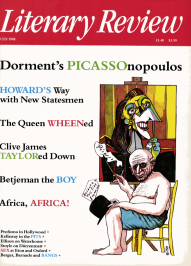Pamela Vandyke Price
Where Does One Stop?
The Demon Drink
By Jancis Robinson
Mitchell Beazley 208pp £9.95
Anything – yes anything – put into human orifices to excess is a potential danger. There are vogues in danger and currently it’s drink, in the alcoholic sense, that’s being castigated. Jancis Robinson is a Master of Wine, a competent journalist – and a ‘young mum’. Her text, which l think might have been more effective as either a monograph or a more substantial work of reference, is somewhat womb-orientated, breasts and foetuses frequently stressed as being at risk for drinking mothers.
Since female readers are addressed as ‘sisters’, I’ll venture a great-auntly comment that, in dealing with women and drink, she might have included both the pre-menstrual and menopausal problems. Why people drink is a complicated subject, but many women must, like me, have had their first nips of brandy or Scotch in hot water for ‘cramps’ and there are probably many older ladies sadly soaking up the sort of wine that can no longer be termed ‘tonic’ just because, whether married, mothers or neither, they are lonely. Alcohol is both a nutrient and nutriment: a pre-prandial sip can create an appetite in the convalescent disinclined for solid food, a nightcap may be far gentler as a sedative than a pill. Jancis writes wisely that alcohol is a ‘desirable mellower of the autumn of life’. Yes – but for the potential geriatric dipsomaniac, where does one stop? Cirrhosis is a remote peril, rheumatism and unpaid bills, plus various forms of heartache, are immediate.
There are lots of facts and figures, although the list of authorities cited is short and mostly of British origin; there are not enough from doctors in wine-producing countries. The author suggests that a day or two of abstention is healthy, if one regularly drinks heavily. Nobody obliged to sample

Sign Up to our newsletter
Receive free articles, highlights from the archive, news, details of prizes, and much more.@Lit_Review
Follow Literary Review on Twitter
Twitter Feed
Under its longest-serving editor, Graydon Carter, Vanity Fair was that rare thing – a New York society magazine that published serious journalism.
@PeterPeteryork looks at what Carter got right.
Peter York - Deluxe Editions
Peter York: Deluxe Editions - When the Going Was Good: An Editor’s Adventures During the Last Golden Age of Magazines by Graydon Carter
literaryreview.co.uk
Henry James returned to America in 1904 with three objectives: to see his brother William, to deliver a series of lectures on Balzac, and to gather material for a pair of books about modern America.
Peter Rose follows James out west.
Peter Rose - The Restless Analyst
Peter Rose: The Restless Analyst - Henry James Comes Home: Rediscovering America in the Gilded Age by Peter Brooks...
literaryreview.co.uk
Vladimir Putin served his apprenticeship in the KGB toward the end of the Cold War, a period during which Western societies were infiltrated by so-called 'illegals'.
Piers Brendon examines how the culture of Soviet spycraft shaped his thinking.
Piers Brendon - Tinker, Tailor, Sleeper, Troll
Piers Brendon: Tinker, Tailor, Sleeper, Troll - The Illegals: Russia’s Most Audacious Spies and the Plot to Infiltrate the West by Shaun Walker
literaryreview.co.uk